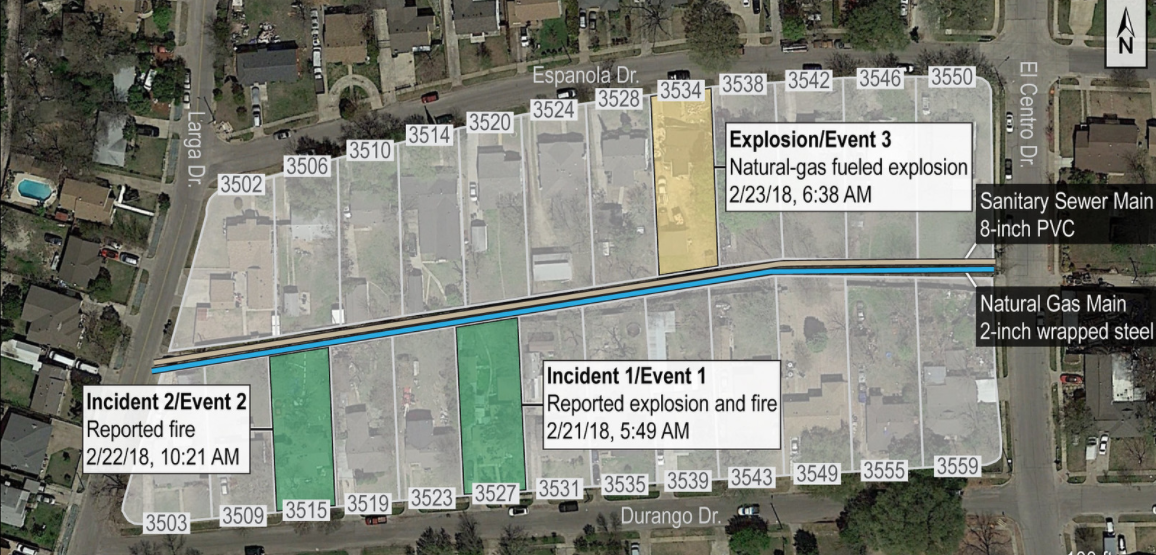NTSB Determines Cause of 2018 Fatal Gas Leak, Dallas Home Explosion
The National Transportation Safety Board issued 14 safety recommendations during a board meeting Tuesday in which the agency determined the probable cause for the Feb. 23, 2018, natural gas explosion in a Dallas home.

Linda 'Michellita' Rogers, 12, died and four others were injured in the explosion at 3534 Espanola Drive, that caused major structural damage to the one-story residence. The NTSB determined that the ignition of an accumulation of natural gas that leaked from the gas main that was damaged during a sewer replacement project 23 years earlier, led to the explosion. Atmos Energy Corporation failed to detect the leak when responding to related incidents at two other homes on the same block in the two days prior to the explosion. The NTSB noted, as part of its probable cause, that contributing to the explosion was Atmos Energy Corporation’s insufficient wet weather leak investigation procedures.
In the report discussed Tuesday, the NTSB found if Atmos had pressure tested the customer piping at the first two incident homes on Feb. 21 or 22, 2018, as soon as it was safe to do so, the data could have more promptly redirected gas leak detection efforts to Atmos-owned piping where leaks were ultimately discovered. Timely pressure testing of the main could have shown it did not hold pressure and spurred additional protective actions that could have prevented the fatal injury at 3534 Espanola Drive. All three homes were served by the same natural gas main. The incidents resulted in significant structural damage and burn injuries to occupants in each home.
“Excavation damage to pipelines is not a new issue for the NTSB,” said NTSB Chairman Robert Sumwalt. “This accident highlights the importance of, and need for, thorough incident investigations and more oversight from regulatory agencies to ensure the integrity of the nation’s pipelines is sustained.”
The NTSB found Atmos Energy Corporation’s inadequate investigation of two gas-related incidents prior to the Espanola drive explosion, and their failure to officially report them, delayed the response from regulatory authorities. The NTSB further determined the Pipeline and Hazardous Materials Safety Administration does not provide clear requirements about the level of investigation necessary to determine whether an event is subject to PHMSA reporting requirements, potentially resulting in the underreporting of natural gas incidents.
As result of the investigation, the NTSB issued 14 safety recommendations with three issued to the Pipeline and Hazardous Materials Safety Administration, one to the Railroad Commission of Texas, three to the Dallas Fire-Rescue Department, five to Atmos Energy Corporation and two to American Gas Association Gas Piping Technology Committee.
These recommendations address safety issues including incident investigation, leak investigations and repairs, methane detection, incident reporting and integrity management.
An abstract of the final report, which includes the findings, probable cause, and all safety recommendations, is available at go.usa.gov/xAEqg.
Links to other publicly released information about this investigation are available at go.usa.gov/xAPMc.
Related News
Related News

- Trump Aims to Revive 1,200-Mile Keystone XL Pipeline Despite Major Challenges
- Valero Considers All Options, Including Sale, for California Refineries Amid Regulatory Pressure
- ConocoPhillips Eyes Sale of $1 Billion Permian Assets Amid Marathon Acquisition
- ONEOK Agrees to Sell Interstate Gas Pipelines to DT Midstream for $1.2 Billion
- Energy Transfer Reaches FID on $2.7 Billion, 2.2 Bcf/d Permian Pipeline
- U.S. LNG Export Growth Faces Uncertainty as Trump’s Tariff Proposal Looms, Analysts Say
- Tullow Oil on Track to Deliver $600 Million Free Cash Flow Over Next 2 Years
- Energy Transfer Reaches FID on $2.7 Billion, 2.2 Bcf/d Permian Pipeline
- GOP Lawmakers Slam New York for Blocking $500 Million Pipeline Project
- Texas Oil Company Challenges $250 Million Insurance Collateral Demand for Pipeline, Offshore Operations




Comments